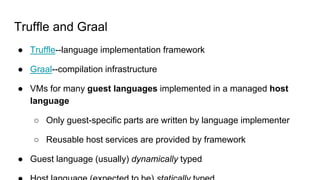One VM to Rule Them All
- 1. One VM to Rule Them All Tianxiang Xiong
- 2. Background ¡ñ A small number of languages have high-perf VMs ¡ð E.g. Java, C# ¡ñ Many languages have low-perf VMs ¡ð Ruby, Python, R, MATLAB, PHP¡ ¡ñ High-perf VMs are currently: ¡ð Highly complex ¡ð Biased towards a single language or family of languages
- 3. Big Idea ¡ñ Create architecture for easily implementing high-perf VMs for new languages 1. Language implementer writes interpreter 2. *A miracle occurs* 3. High-performance VM
- 4. Truffle and Graal ¡ñ Truffle--language implementation framework ¡ñ Graal--compilation infrastructure ¡ñ VMs for many guest languages implemented in a managed host language ¡ð Only guest-specific parts are written by language implementer ¡ð Reusable host services are provided by framework ¡ñ Guest language (usually) dynamically typed
- 6. AST and Optimization ¡ñ Guest language implements AST interpreter ¡ñ Node rewriting--during interpretation, a node can replace itself w/ another, based on profiling feedback: ¡ð Dynamic type info ¡ð Execution freqs ¡ð Rate of node rewrites ¡ñ When compiler is evoked, it uses profiling info to partially evaluate the AST interpreter
- 7. AST and Deoptimization ¡ñ Parts of interpreter responsible for node rewriting are omitted from compilation ¡ð Branches that perform rewriting cause deoptimization ¡ñ Deoptimization--when type specialization fails, optimized code is discarded and execution reverts to interpreter ¡ñ More info is gathered during interpretation, followed by another round of partial evaluation, and so on
- 9. Node Rewriting Conditions ¡ñ Guest language developer is responsible for fulfilling conditions of node rewriting: ¡ð Completeness--node provides rewrites for all cases it does not handle ¡ð Finiteness--After finite # of node rewrites, must end up in state that handles full language semantics ¡ð Locality--a node can only rewrite itself and its subtree
- 10. Branch probabilities and loop freqs ¡ñ Guest lang interpreter author is also (optionally) responsible for providing: ¡ð Branch probabilities ¡ð Loop frequencies ¡ñ Interpreter can do profiling for optimizing compiler ¡ð If not, values are derived from host system during partial evaluation
- 11. Related Work ¡ñ PyPy ¡ð Big idea: write interpreter in high-level (less dynamic) lang, then generate custom VM, tracing dynamic compiler form interpreter ¡ð Python interpreter, VM written in RPython -> translated to C ¡ñ Self-optimizing interpreters ¡ð Compilers can perform optimizations beyond reach of interpreters ¡ñ Compile to IR (e.g. LLVM), e.g. Rubinius
- 12. TruffleClojure ¡ñ TruffleClojure ¡ð Master¡¯s thesis, not ready for use ¡ñ Features: ¡ð Implements TCO (by avoiding Java bytecode) ¡ð Perf improvements via type specialization (e.g. of contains?)












